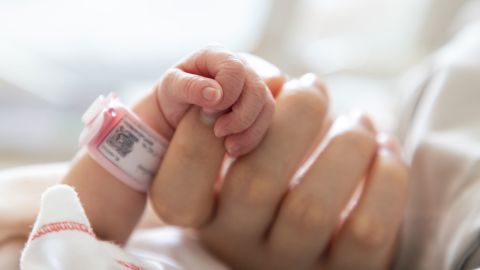Ashley Martinez has four sons and is pregnant with the daughter she’s wanted for years.
Last month, she posted a video online imploring doctors to prioritize her life, not the life of her unborn baby, if complications arise when she is in labor and it comes down to that choice.
The San Antonio, Texas, resident is due in May and is one of a number of pregnant people who have recently posted “living will” videos on TikTok.
Martinez had an emergency C-section during her last pregnancy after her umbilical cord came out before her baby, a rare but dangerous condition known as an umbilical cord prolapse that can deprive a baby of vital blood flow and oxygen.
Martinez described her last delivery as terrifying. Eight months after the Supreme Court reversed Roe v. Wade, ending a constitutional right to abortion, she said she worries about what would happen if she faced similar challenges again.
Since the ruling in June, a number of US states have criminalized abortions, leading to some fears that doctors would prioritize the life of the unborn child during a medical emergency.
Martinez lost her mother to non-Hodgkin’s lymphoma at a young age, and the thought of her children going through a similar tragedy terrifies her.
“Having to go into another delivery where I’m going to have a C-section, it’s scary for me,” said the 29-year-old. “My fourth pregnancy was my only C-section. I’ve always thought about not being here for my kids just because of what I went through growing up without my mom.”
More than a dozen US states have banned or severely restricted access to abortions following the Supreme Court’s decision eight months ago. The abortion bans have led to legal chaos as advocates take the fight to courtrooms.
Even so, several ob/gyns told CNN that a hard choice between saving a mother and baby’s lives at childbirth, like the one outlined in the TikTok videos, is highly unlikely.
The ‘living will’ TikTok trend has sparked strong emotions
This trend on TikTok has sparked a flurry of dueling videos among pregnant women and other people. Some have posted videos telling doctors in such situations to prioritize their unborn babies first, and criticizing those who expressed a different view.
Martinez concedes that her mother, who died at 25, would likely have chosen to save her child first if she could.
“My mother, she didn’t have a choice, you know?” Martinez said. “The message that I want to send is just basically nobody is wrong or right in this situation. In both situations, it is a hard decision to pick your children over your unborn baby.”
In Texas, where Martinez lives, abortions are banned at all stages of pregnancy – unless there’s a life-threatening medical emergency.
Dr. Franziska Haydanek, an ob/gyn in Rochester, New York, who shares medical advice on TikTok, said she’s noticed many “living will” videos in recent months.

In most of the videos, a woman appears alongside a written message saying something like, “If there are complications during childbirth, save me before the baby.” Some people, including Martinez, reference their children in their decision and even show them in the video.
One was posted by Tuscany Gunter, 22, a woman whose baby is due in April. Abortion after 20 weeks of pregnancy is illegal in her home state of North Carolina, and Gunter told CNN she filmed her message in solidarity with others who said they would choose themselves first.
“I wanted to make it known where I stand and to stand up with other women who are getting bashed online for saying they would rather be saved first over their baby,” said Gunter, who lives in Fayetteville.
“As a mother to three young children, I cannot dump the emotional trauma of losing their mother on them as children and expect them to cope. While I would be crushed to lose a baby, I need to think of my other living children as well … And I know the baby that passed would be safe without ever having to experience any pain or sadness.”
Another woman, Leslie Tovar of Portland, Oregon, said that even though her state has no legal restrictions on abortion, she posted her video because she feared doctors would prioritize saving her unborn child to avoid legal ramifications in the post-Roe v. Wade era.
“I have two other kids at home who need mom. I can’t bear the thought of my two young boys ages 6 and 4 without their mom,” she said.
All three women said they’ve had these conversations with their partners, who agreed they should be saved first.
Of her husband, Tovar said, “His exact words were, ‘We could always have another baby later in life but there is never replacing the mother of my boys, I couldn’t do this without you.’”
Doctors don’t pick who to save during labor, experts say
It’s true that complications occasionally come up during a pregnancy that lead doctors to recommend delivery to save the mother’s life, medical experts said.
If this is done before a fetus is viable – under 24 weeks – the chances of the baby’s survival are low, said Dr. Elizabeth Langen, a maternal-fetal medicine physician at the University of Michigan Von Voigtlander Women’s Hospital.
Roe v. Wade’s reversal did make terminating such pregnancies more complicated, Langen and Haydanek say.

In cases involving a baby that’s not viable, it could mean that even when the baby is unlikely to survive and the mom’s health is at risk, the priority will be on saving the baby due to fear of legal ramifications, Langen said.
But both doctors say these scenarios don’t occur during the birth of a viable baby. In that instance, Roe v. Wade is “less involved,” Haydanek said.
“We do everything in our efforts to save both (mother and baby),” she said. “I can’t think of a time where the medical team has had to make a decision about who to save in a viable laboring patient. It’s just not a real scenario in modern medicine – just one we are seeing played out on TV.”
Hospitals have enough resources – obstetrics and neonatal intensive care unit teams, for example – to meet the needs of both the mother and the baby, Haydanek and Langen said.
“We’re usually doing our best to take care of both the mom and the baby. And there’s very rarely a circumstance where we will do something to harm the mom in order to have the benefit of the baby,” added Langen.
“If mom’s health is deteriorating, ultimately, she’s not going to be able to support baby’s wellbeing,” Langen said. “And so generally, what we encourage folks to do is really support mom’s health, because that’s in the best interest of both mother and baby.”

Both doctors said it’s important for patients to talk to their health care providers about their medical concerns and share their “living will” wishes with loved ones in case there are complications during labor that require partners to make medical decisions.
However, those decisions will not involve doctors asking your partner whose life should come first, they said.
“Before getting in a fight with your partner about who they choose to save, know that there isn’t a situation where we will ask them that,” said Haydanek, who has called the TikTok trend “horribly anxiety inducing.”
She said it’s come up so many times in recent months that she made her own TikTok video to reassure expectant parents.
“Please don’t feel like you have to make this choice,” she says in the video. “I know firsthand how much anxiety there can be in pregnancy … but it’s just not a situation that you’re gonna find yourself in.”
Health - Latest - Google News
February 19, 2023 at 01:20AM
https://ift.tt/tFjRguv
Pregnant women, fearing complications during childbirth, are posting 'living wills' on TikTok - CNN
Health - Latest - Google News
https://ift.tt/Jqyf4aB

No comments:
Post a Comment